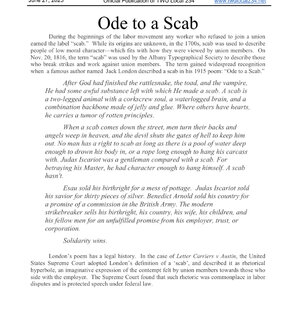The truth of the Del Smith quote is not that it was his money specifically, but that most people who work for a company have no ideas about their business that extend beyond their pay stub. If they had to make payroll, using the company's money, it would be a revelation for most people. Even a shock.
The better idea is for workers to refuse to offer their services to unsafe or otherwise unscupulous operators. If no one agrrees to work, then an operator is forced to change. Sure, that's a utopian view of capitalism, I admit. Pilots can and do make an impact on carriers and their management styles. Happy pilots attract more pilots. It's a matter or word of mouth and industry reputation that can make or break a carrier from the labor cost standpoint.
Just as we like to inform new pilots about PFT and the carriers who rely on it, we can also draw conclusions about which carriers are safe and pay a decent wage. Southwest is a good example of some of the best labor relations you can have. Rather than the adversarial relationship established by pilot union leadership over the past thirty years, Southwest shows that a good relationship can exist with pay and safety that are fair and reasonable in a competitive market. If owning an airline was a wise investment (which it very likely is not) then the most succcessful airline in the world would be one owned by workers who banded together and pooled their monies and made the wisest choices possible in the forming and running of their airline. Most people with a specialty like flying airplanes lack the special education, connections with finance, and business expertise necessary to run an airline. Now if no pilot group has successfully pooled their resources and produced the world's best and most profitable airline for whom they can work, then how can another pilot group have the business sense to know the difference between being paid fairly and bleeding their company dry to the point of being noncompetitive?
When ALPA started it did indeed make a signifigant impact on raising safety. There is no denying that. But, as the od saw goes, that was then and this is now. The safety aspect has been taken over by the FAA. What was once an effective group focused on safety has become marginalized by their own shortsightedness with respect to smaller aircraft, and by the market with respect to discount operators that have brought wages down to earth and placed them on a level playing field with earnings.
ALPA is not the only union group who is behind the power curve. Take the trade unions in Philadelphia, for example. Often, the Pennsylvania Convention Center, a very impressive structure on the site of the old Reading Railroad train shed, is empty. Why? Convention planners have learned that the trade unions here are predatory, and can take the cost of a convention and, are you ready for this, nearly TRIPLE the cost of the event. So, convention events are going elsewhere. Smooth, Philly. Very smooth.
SAG and AFTRA exist only in a handful of cities, where they once ruled entire networks. Viacom, the company that owns MTV, is 100% a non-union company.
The truth is that people are now able to have jobs, fly airplanes, make movies, produce TV and radio, all without unions. They aren't getting voted in. People are figuring out that unions are shrinking, and it is unwise to shrink with them. If everyone voted in a union in every walk of life, competition could be maintained. If people are already happy, like at the ABC affiliate in Philly, they never vote in the union. Be competitive, have a job. Be uncompetitive nowdays, and you can find yourself saying "I had a union job."
How many pilots are saying that right now?






